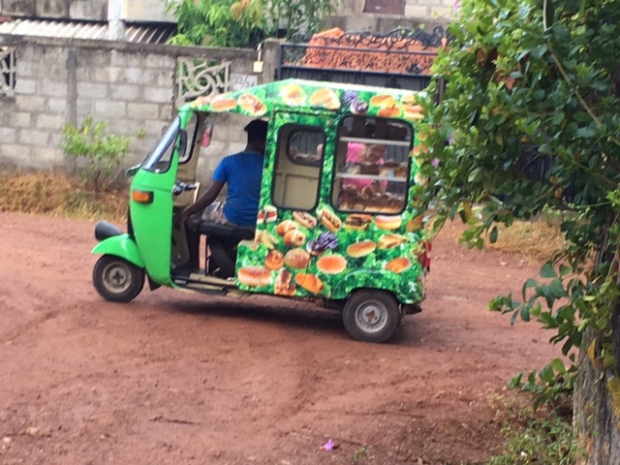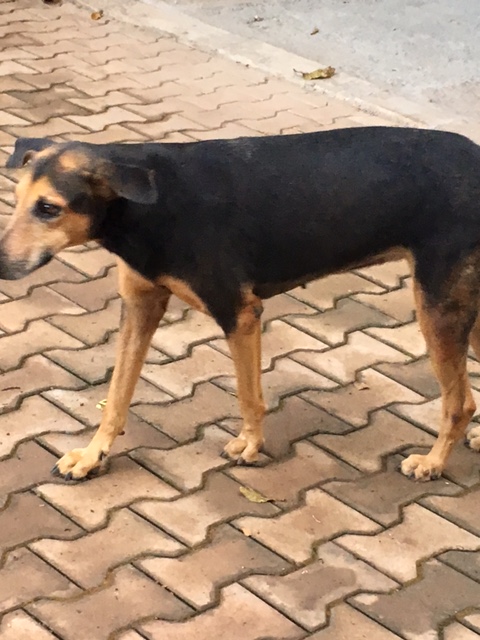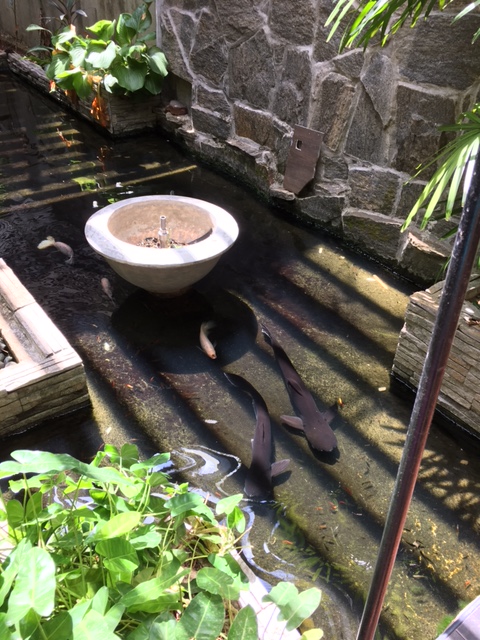On Tuesday I experienced what it must be like to be a steamed and roasted chicken covered in oil. I am having some Ayurvedic sessions hoping to improve my health. They begin with an Indian head massage.
Sitting in companionable silence alongside a petite German lady, who had her Ethiopian holiday changed a week before she travelled, (considered too dangerous), we were both commencing our treatments with said head massage. Starkers except for knickers and a huge orange bath towel, which just wrapped around me but the German lady could have wrapped it around herself twice! We both sat in comfortable chairs in the open air, facing the ocean and watched the waves rise and froth and gently roll into the golden sandy shore. There were only a couple of security guards around all week but a couple of dozen French holidaymakers arrived yesterday and they took to the waves this morning.
One of the security guards works for the Maalu Maalu Hotel and Spa and the other one works for the hotel next door. I would stay here longer if I could. It is just amazing and the food is brilliant too.
I got more than my German friend, as my masseuse chants softly each time she starts the head massage. Off to one of the treatment rooms along the corridor of gaily painted doors and on to the high table to have my body pummelled and pulled and oiled. When I am turned face down I find myself staring at lotus blossom floating in a bowl below the massage table. There are yellow trumpet flower heads and dark green glossy leaves scattered here there and everywhere, even in the toilet which is at the end of the corridor.
All is open to the elements with a thatched vaulted roof above to protect you from the sun. Coconut palms and bushes sway in the breeze alongside the Ayurvedic suite of rooms. Coloured canvas blinds can be pulled down as protection from the sun and there is a huge piece of blue silk with an embroidered gold border along each side of the length of the piece of silk. There are dots of gold all over the material which may have been a sari in an earlier life. It is stretched on bamboo in line with the table and about five feet above.
You would almost dose off but for the request, ‘madam turn over, madam sit up, etc.’ Eventually madam is guided to a steam contraption in another room. The only way I can describe it is like a wooden clinker built version of the iron lungs we used to see polio victims in when I was a child. It was like a huge clam shell open and waiting for me to climb in so it could snap shut!
I hoisted my oiled body up and lay on a thick towel above the slatted base. The slip of a girl, always quiet, always serious, indicated I should move over a tad to my right otherwise my left arm would be caught in the door as it came down. I duly moved over and within seconds found myself encased in the wooden steamer with only my head protruding.
I didn’t see any dials so maybe the heat temperature was operated automatically. I lay there growing hotter and hotter. My girl went out of the room and I wondered what I would do if it got too hot. I thought of the large stainless steel domed barbecue my cousin in Penticton has out on his deck where he does most of the cooking, even in the winter. I thought I knew just how these oil-basted lumps of chicken felt as he closes the domed cover so the meat can cook through.
But just before I was on the point of yelling for help she came back in and asked if I was okay – which I was and then she went off again! Not wanting to appear a wimp or anything but I didn’t like being left on my own and with my overactive imagination I fancied scenarios of the whole thing blowing up and me being thrown like a large white oiled whale up into the air and landing somewhere out in the ocean.
Before I could lose my mind completely and I was really quite hot by this time, the gaoler came in and released me and I returned ensconced in yet another large orange bath towel to what has become ‘my treatment room.’
Unexpectedly one of the stretches of nerve pain I have had from the shingles, for eighteen months, has gone. The doctor here believes it is because of an oil the masseuse used and left on me like a poultice. The oil is one that the Ayurvedic doctors use to treat the chicken pox virus and of course shingles are related to the same virus.
They have since used the same oil in the same way on the two other stretches of shingle nerve pain I have had without success but are having another attempt today. It would be worth this whole trip to be pain-free. So here’s hoping.








